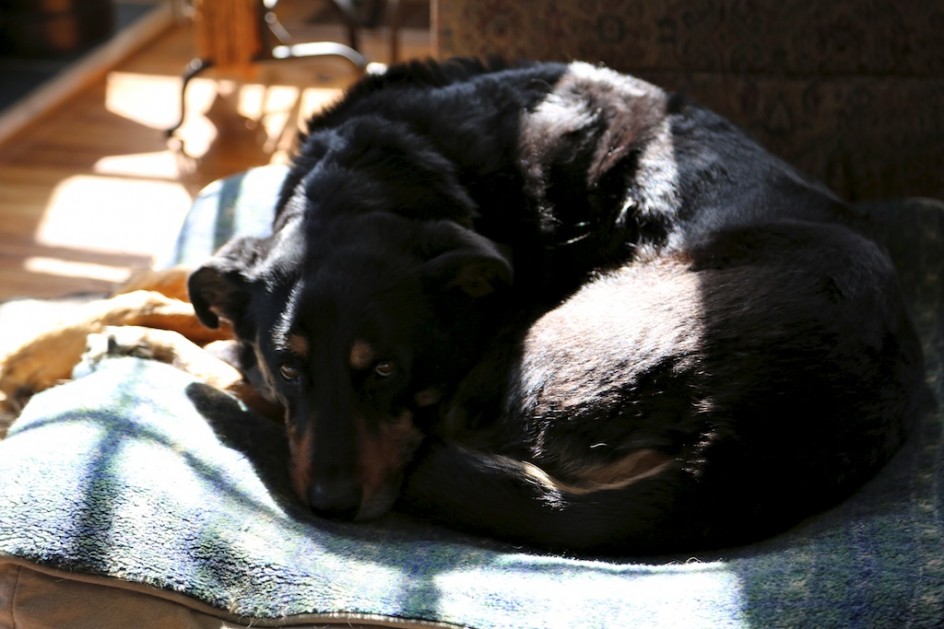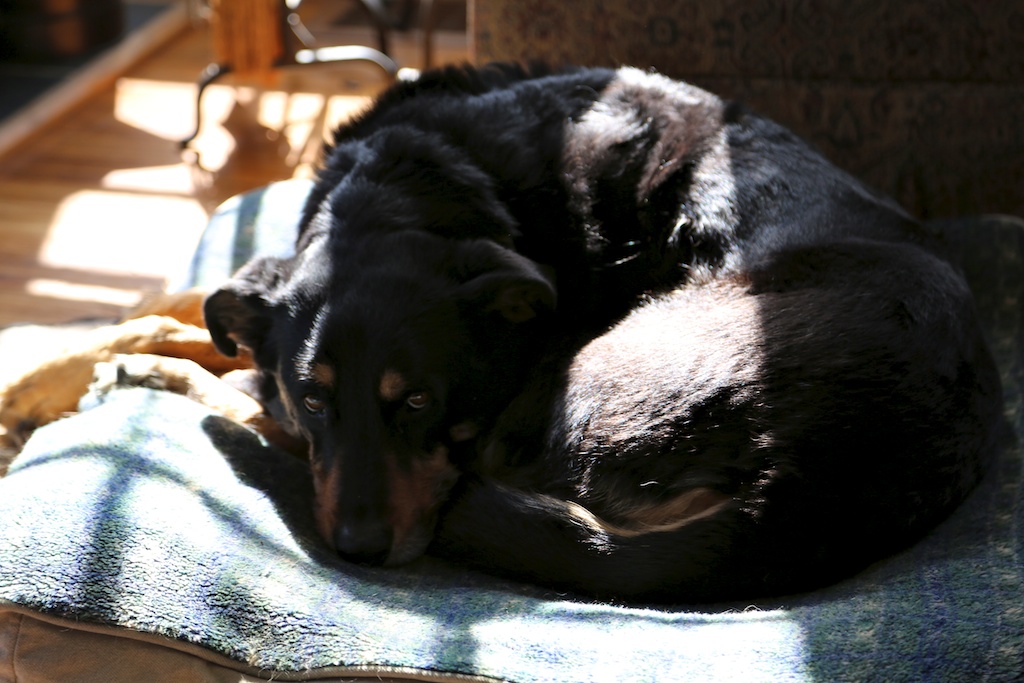
This is a short story – fiction – inspired by a real writer.
Stanley, a once-famous animal writer, was at the end of his rope, as well as his publishing contract. His wife had gone to live with her mother, his daughter wouldn’t return his phone calls, he wasn’t going to meet the mortgage payment this month. he was depressed. His ancient Lab, Perocles was having panic attacks and was on anti-depressants that cost $300 a month. After the recession hit, his agent called him and said he couldn’t sell a book of Stanley’s anywhere, and even the self-publishers didn’t want his work. But, he said, the news wasn’t all bad. There was interest.
Some guy in Trinidad had e-mailed him and said he loved Stanley’s writing and had work for him. Could he fly down there? Like most writers, Stanley was not about to pass up a free trip to a Caribbean Island. And he needed work. So he flew to Trinidad. First class – he had never flown first class – and he would be in a luxury suite in a five star hotel.
Stanley, a nervous and impatient man, waited in his luxurious room on the ocean for hours until finally there was a scratching at the door, and he opened it to find a short, almost hairless bright-eyed mutt staring up at him. “Hey,” said the dog, “I know you were expecting a human, but I am a dog, Paco and I am the one hiring you and paying for your work. Just get over it and it will go easier.” Stanley’s mouth was open for awhile, but remembering what his agent had said, he got over it, especially when Paco told Stanley he loved his work. The dog, he had to admit, was well-spoken and courteous. Stanley invited Paco in, and offered him a bowl of water and the remnants of a hamburger, which Paco declined. He had already had dinner, he said, and was cutting back on fatty foods.
Paco got down to business. He had a booming business going, selling Caribbean rescue dogs to Americans who were happy to pay to fly them to the United States and pay rescue and handling fees as well, ranging from $200 to $500.” Paco jumped up on the couch and looked Stanley in the eye (the ocean waves were crashing against the beach as a background, which was nice, even dramatic).
“I’ll be honest with you,” Paco said. “We all think Americans are crazy. Banks there rob people, hit them on the head and take their money and throw them out of their homes and into the street, and nobody says a thing. But they all want rescue dogs from the Caribbean, no matter what it costs. Strange country. They don’t want happy dogs, only sad ones. If you tell them the dog was happy and healthy and for sale, no deal. If the dog has a sob story, they go right away. So when the dog bites Grandma, or throws up on the rug, or digs up the flowers, they cry for him, poor abused thing, instead of kicking him the ass.”
Paco said the Caribbean dogs – including him – were stunned by this phenomenon, but also happy, as they had never been worth any money, or even anyone pay for them. Not to mention transport fees on airlines, and good lives in America eating rich food, having toys, fancy collars and sleeping in beds. Can you imagine, said Paco? It started when tourists saw hungry dogs in the streets and took them home. Now they didn’t need to see them. They just needed the sad story. So they were breeding like crazy, trying to meet demand. They had to move fast before the Americans figured out out that there were a million dogs on Petfinder.org right in the U.S. and many more million in shelters, and they could just drive a few miles and pick one up. Paco knew his stats and demographics.
Yes, thought Stanley, Paco was a wise dog. And this was all curious. But what did this have to do with him? He used to be reviewed in the New York Times, and now was trying to impress a balding dog who talked.
I need stories for these dogs, said Paco. We are breeding them as fast as we can, but everybody wants a sad story to tell their friends about them, each sadder than the next and we need you to come up with them. We are running out of new ones. Come down the beach tomorrow and dawn and you’ll meet the dogs and come up with stories for them. $100 a story.
Stanley said yes, didn’t think much about it. He didn’t want to go home. “Thing is,” said, Paco, “we need sob stories, tear jerkers. You can’t tell your neighbors in America that your dog is just a dog. That would make you seem immoral and cold. Americans don’t want dogs, they want dogs in trouble. With stories. Over there, in America, they yell at each other all the time, poor people can’t afford medicine, but they’ll do anything for a dog with a story. You gotta make them cry, Stanley.”
Paco made a quick call, then told Stanley he was loving his IPhone, which was strapped to his collar most of the time, and was training Siri, the personal assistant to help him keep records. “She’s not Hal, she’s not a miracle worker,” he said, “and she doesn’t really get the dog thing, but she is learning to understand me and is a big help. I loved Steve Jobs,” said Paco, almost tearing up. “He changed my life.”
At dawn the next morning, in a secluded cove, scores of Caribbean mutts – some flown in from Puerto Rico and Barbados and the Virgin Islands, a few even smuggled in from Cuba – were waiting in a huge line for Stanley. Paco had reminded Stanley that all of the dogs had to be abused – that was essential. Otherwise, he had creative license. He was the writer, said Paco, sensitively. He had some tips. It was good if the females, the mothers, had lost their puppies, that was a huge seller, they practically flew to the U.S. all by themselves. Or if the dogs had been beaten and abandoned in a slum, found dying in doorways and alleys. Or were near starvation. But Paco wanted fresh stories, and the demand was growing.
Can’t any of the stories be happy?, Stanley wondered, for the last time. He wasn’t sure he could only write sad stories. No, said Paco, they tried happy stories, and nobody wanted the dogs. They were unadoptable, doomed to years in crates.
Stanley did get to work. He met each dog, asked a few questions, checked out any identifiable markings – colors, scars, spots – took a few notes, and then, in the afternoon, sat on the beach drinking Rum Punches, eating plantain chips by the bucket, listening to the waves and looking at the girls in bikinis and writing his stories on the Ipad that Paco distributed to everyone in his company. Stanley, to his relief, was good at this. If his publishers always wanted his stories to be upbeat, Paco didn’t care what he wrote as long as they were downbeat. It was, he thought, a great gig. America and all of its publishing turmoil – Amazon, E-books, troubled bookstores – seemed far away.
Stanley kept some of the staple stories – beaten dog rescued by tourists, mom nearly dies giving birth, puppies don’t make it, dog saved from drowning, dogs with exotic diseases, dogs beaten by street bums. And he added some twists. Dogs who escaped drug dealers, dogs who lived on boats and were thrown overboard, dogs who lived in the jungle and were bitten by snakes. Dogs who battled alligators. He even wrote about one poor scrawny little mutt who was assaulted by a gang of parakeets. And he had a bunch of stories about dogs who were beaten trying to save abused spouses. Dogs coming of age by hiking across islands and swimming many miles. Very new, very now. He felt as if he were coming back to life as a writer. And he was making money, for the first time in years. Good money.
Stanley and Paco worked well together. Paco’s sales went up as the stories improved and diversified. “You are gifted,” he told Stanley every morning. Stanley had not head that in years. Paco especially loved one story Stanley wrote of a band of one-eyed brown mongrels who were political dogs, who escaped tyrannical politicians and broke for freedom on the beach. They needed asylum. Those dogs went for $500 a pop in minutes. Paco mulled raising prices, and spent half the day posting these stories on his blog, where he was hailed all over the world for his rescue work. His Facebook Page – he thought Twitter was too elitist – had 20,000 likes, and when Stanley came up with his Pirate Dog Series – dogs taken into captivity, tortured by pirates and abandoned on city streets, Paco gave him a bonus and made him a partner in the company, which he re-named “Dog Rescue Stories From Paradise.” Paco was offered three book deals and one movie deal, and he took one of the book deals, but not the movie offer. “Can you imagine when they meet me?” he howled, his tail and body shaking with laughter.
Stanley’s family and friends wondered for years what happened to him, as he never came back to the States. Finally, his agent tracked him down and told him some good news – the economy was improving and he could get him a book deal.
“No thanks,” said Stanley, I’m not coming back. He turned away from the phone.
“Is that a dog I hear barking in the background?,” asked the agent.
“Oh, yes,” said Stanley. “I just gave Juan a biscuit. He was trapped in house when an earthquake hit. He refused to abandon his owners for weeks until rescuers got through, and he was nearly dead when they found him. He could have eaten them, but chose to wither instead. I took him in. I think he was clearly abused, too. He bit an old man on the toe, but what can you expect, the way men have treated him? I love him more than I can say.”
The agent said Stanley was a good man, and he admired him for the work he was doing, which, he said, was much more important than writing books, and he wished him well.

